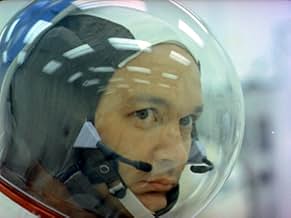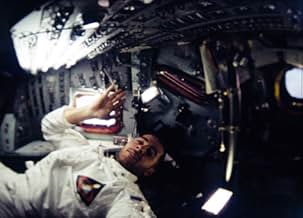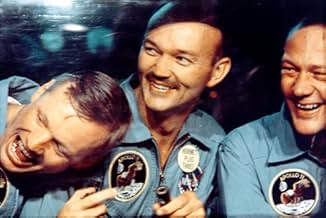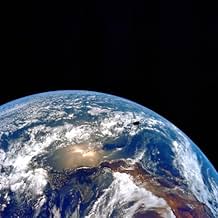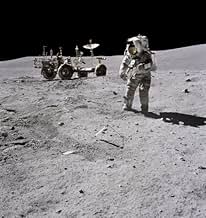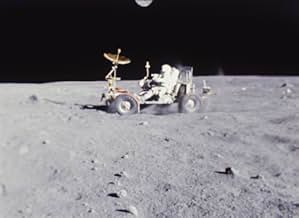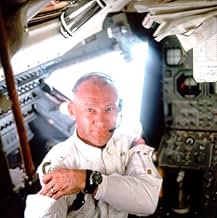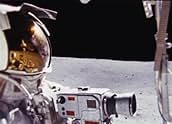VALUTAZIONE IMDb
8,0/10
7026
LA TUA VALUTAZIONE
Aggiungi una trama nella tua linguaThe crew members of NASA's Apollo missions tell their story in their own words.The crew members of NASA's Apollo missions tell their story in their own words.The crew members of NASA's Apollo missions tell their story in their own words.
- Premi
- 6 vittorie e 13 candidature totali
Jim Lovell
- Self
- (as James Lovell)
Edgar D. Mitchell
- Self
- (as Edgar Mitchell)
Dave Scott
- Self
- (as David Scott)
William Anders
- Self
- (filmato d'archivio)
Neil Armstrong
- Self
- (filmato d'archivio)
Stephen Armstrong
- Self
- (filmato d'archivio)
Viola Armstrong
- Self
- (filmato d'archivio)
Jules Bergman
- Self
- (filmato d'archivio)
Frank Borman
- Self
- (filmato d'archivio)
Roger B. Chaffee
- Self
- (filmato d'archivio)
Yuri Gagarin
- Self
- (filmato d'archivio)
Recensioni in evidenza
10Kwp
There have been many documentaries about the technical issues of getting to the Moon, but this one focuses more on how the astronauts felt about it all. At turns funny (Buzz Aldrin admits he relieved himself right before stepping on the Moon because it was about the only spare time he was going to have for the next two hours), inspiring (Jim Lovell talking about reading from Genesis while orbiting the Moon), and poignant (several of the astronauts talk about the Apollo 1 fire), it's a riveting piece of film-making.
The footage itself switches between the "talking heads" of the astronauts and imagery depicting what they're talking about, loosely following the chronology of the space age, from Kennedy's declaration of the ambition to go to the Moon to the later Apollo missions with the lunar rover. There aren't any revelations in the mission footage, but then all that's been combed over many times. However, it's well put together and everything is tied in.
I got to see this film at a special showing at the Goddard Space Flight Center. When the film was over, the auditorium full of space geeks gave the director a standing ovation. I think it was well-deserved. While he humbly noted "It's you rocket scientists who really did this - I just put a film together," perhaps - as he also noted - this film will help inspire another generation as we take the next great leap into space, this time to Mars.
The footage itself switches between the "talking heads" of the astronauts and imagery depicting what they're talking about, loosely following the chronology of the space age, from Kennedy's declaration of the ambition to go to the Moon to the later Apollo missions with the lunar rover. There aren't any revelations in the mission footage, but then all that's been combed over many times. However, it's well put together and everything is tied in.
I got to see this film at a special showing at the Goddard Space Flight Center. When the film was over, the auditorium full of space geeks gave the director a standing ovation. I think it was well-deserved. While he humbly noted "It's you rocket scientists who really did this - I just put a film together," perhaps - as he also noted - this film will help inspire another generation as we take the next great leap into space, this time to Mars.
Saw this film at Sundance, the screening reserved for the Grand Jury World Documentary Award Winner. Wow! I have seen many of the preceding documentaries on the history of the American space program, the Apollo program in particular. Where this documentary exceeds all previous efforts was in revealing the humanity of the astronauts. Most other documentaries focus on the politics which motivated and technical hurdles overcome in the American space program. David Sington brilliantly uses only the astronauts voices for narration of facts and more with newly released footage from NASA, as well as a lot of footage we've all seen before. Because of the free rein given to the astronauts in the interviews, you see many sides of each revealed. For instance, Mike Collins (who has heretofore rarely been interviewed) reveals wonderful humor and joy in his accomplishments. You find out more about their worries and fears, how they look back on their work and what they were thinking at the time. They are all revealed as nice guys with whom you would want to spend an afternoon.
Strangely absent, but it works well in the end, was Armstrong. He gives virtually no interviews. In a way, having everyone else talk about him is maybe better than him talking.
And, the various conspiracy theories are dealt with in the end credits. This is a great place to do it. In films we sometimes see the end credits used for humorous out-takes, epilogue commentary, and so forth. By dealing with the conspiracy theories in an appended manner during the credits, the film refuses to elevate them to the level of legitimacy that the remainder of the facts and biographical material, yet still dismisses them. The single best dismissal is this: If it was all faked, why did they fake it so many times? Wouldn't once have been enough?
See this film when it comes to your neighborhood theater, as it has been announced as having a distribution deal. It is worth seeing on the big screen for its amazing visuals.
Strangely absent, but it works well in the end, was Armstrong. He gives virtually no interviews. In a way, having everyone else talk about him is maybe better than him talking.
And, the various conspiracy theories are dealt with in the end credits. This is a great place to do it. In films we sometimes see the end credits used for humorous out-takes, epilogue commentary, and so forth. By dealing with the conspiracy theories in an appended manner during the credits, the film refuses to elevate them to the level of legitimacy that the remainder of the facts and biographical material, yet still dismisses them. The single best dismissal is this: If it was all faked, why did they fake it so many times? Wouldn't once have been enough?
See this film when it comes to your neighborhood theater, as it has been announced as having a distribution deal. It is worth seeing on the big screen for its amazing visuals.
From 1969 to 1972, America put 12 men on the moon in nine missions. Eight of the surviving crew members (notably absent is the reclusive Neil Armstrong) talk about their adventures in the documentary In the Shadow of the Moon with less of the engineering and more of the philosophy, a bit different from the dramatic renditions of The Right Stuff, Apollo 13, and HBO'S From Earth to the Moon.
The excellence of this version is the articulate, close up, talking heads of the astronauts, who are more handsome in their late 70's than they were in their late 20's, a testimony to space athletes who keep themselves fit forever. Besides their reflective narrations (for instance, Mike Collins is full of insights and glamorous details, Jim Lovell could do color commentary for any network), the photography, some of it never seen from NASA archives, is memorable. The earth as blue bubble is beautiful.
The documentary strays somewhat from the reality base by peppering the denouement with sappy, semi-religious contemplations from the narrators about "God's work" and the "fragility" motif. But all in all, this Ron Howard production is a first-rate retrospective about an era for which Americans should be proudthe contrast between the visionary Kennedy and the current blind Bush is painful. Maybe we should send him to the moon?
The excellence of this version is the articulate, close up, talking heads of the astronauts, who are more handsome in their late 70's than they were in their late 20's, a testimony to space athletes who keep themselves fit forever. Besides their reflective narrations (for instance, Mike Collins is full of insights and glamorous details, Jim Lovell could do color commentary for any network), the photography, some of it never seen from NASA archives, is memorable. The earth as blue bubble is beautiful.
The documentary strays somewhat from the reality base by peppering the denouement with sappy, semi-religious contemplations from the narrators about "God's work" and the "fragility" motif. But all in all, this Ron Howard production is a first-rate retrospective about an era for which Americans should be proudthe contrast between the visionary Kennedy and the current blind Bush is painful. Maybe we should send him to the moon?
And I mean it. The footage and stories in this movie were like nothing I've ever seen. Nor have many others because this film includes new footage and stories of the Apollo space missions never seen nor heard. I went to an advance screening at the Sarasota Film Festival and I was extremely impressed as was the rest of the crowd. There was a very long standing ovation at the end of the movie. The film includes at least one member from each of the Apollo missions telling there stories of the process they went through while preparing to land on the moon. It contains the remarkable footage filmed by the crew members of each mission. If you truly want to be left see a movie that will leave you full of excitement and amaze you must see this movie. The host of the film said this film was the reason movies should be made and he was nothing short of the truth.
Bravo to everyone involved in this great film. I just caught it at the 16th Philadelphia Film Festival. Director David Sington answered questions eloquently and patiently as I sat stunned after the film. Having read every Apollo astronaut biography I know to exist I didn't think I'd learn much in the way of facts from the movie, but it turns out there were a couple of things. It is great to see these men who gave so much to my generation talking about the experience decades later. They are wiser and gentler people than when they flew the spacecraft. Sington stated that he wanted to show the events from the point of view of the astronauts. He succeeds, and the experience is moving and meaningful to everyone who looked out from this world in a state of wonder. The Apollo program remains something similar to Leonardo's sketch of a helicopter--an idea ahead of its time technologically, politically and economically, here at the very start of humanity's adventure in the Universe, only a few thousand years after we started using agriculture and so on. When future generations wonder what was going on during the Apollo decade I think this movie is one of the things they'll be looking at.
Lo sapevi?
- QuizOf all the astronauts who appeared in the film, only Buzz Aldrin demanded to be paid.
- BlooperThe 1202 alarm was not a programming error in the Apollo Guidance Computer, but rather a hardware design bug, already documented by Apollo 5 engineers. Since the 1202 alarm had occurred only once during testing, NASA decided to go with the radar hardware with known problems instead of using untested newer alternatives with unknown problems.
- Citazioni
Jim Lovell: We changed our plans on Apollo 8. They changed the mission from an Earth orbital type to a flight to the Moon. And it was a bold move. It had some risky aspects to it. But it was a time when we made bold moves.
- ConnessioniAlternate-language version of Universum: Im Schatten des Mondes (2009)
I più visti
Accedi per valutare e creare un elenco di titoli salvati per ottenere consigli personalizzati
Dettagli
- Data di uscita
- Paesi di origine
- Siti ufficiali
- Lingue
- Celebre anche come
- Vùng Khuất Của Mặt Trăng
- Aziende produttrici
- Vedi altri crediti dell’azienda su IMDbPro
Botteghino
- Budget
- 2.000.000 USD (previsto)
- Lordo Stati Uniti e Canada
- 1.134.358 USD
- Fine settimana di apertura Stati Uniti e Canada
- 38.281 USD
- 9 set 2007
- Lordo in tutto il mondo
- 2.161.369 USD
- Tempo di esecuzione1 ora 40 minuti
- Colore
- Mix di suoni
- Proporzioni
- 1.85 : 1
Contribuisci a questa pagina
Suggerisci una modifica o aggiungi i contenuti mancanti

Divario superiore
By what name was In the Shadow of the Moon (2007) officially released in India in English?
Rispondi





